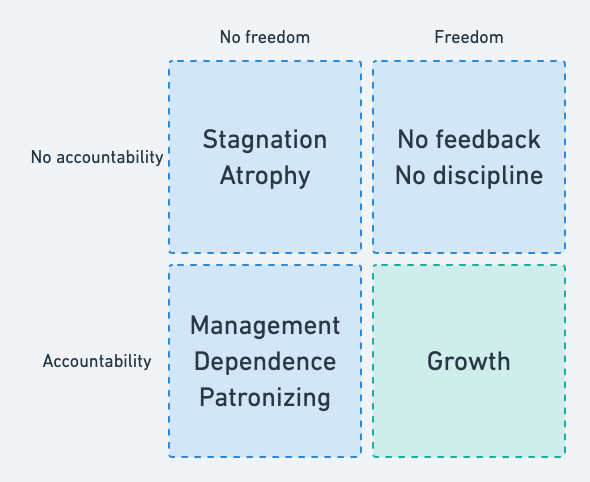Freedom and accountability
One question that people wonder about and gets discussed the most is the motivation question: "what's needed for an individual to be motivated and engaged in what they do?". I've heard very different answers to this question, but very few of these actually made sense to me. This is my attempt to debunk some of the answers that I often get, and explain my own.
Common answers
Let's measure productivity with something like story points and velocity, so that the team gets to know how much progress they've made. Imaginary points never really motivated anyone, and it's silly to think they ever will. This is mostly because these points don't really have any correlation to the value being provided. Customers don't value results more just because it took longer to build.
Let's give stock options and additional bonus income based on the company's revenue. This is also a myth – people do not become motivated just because the company is doing well. In many cases the "wellness" of a company might be due to some other people doing a good job (say, the sales team), in which case, you didn't really take part in that. When the reward/punishment depends on too many people, it won't make any impact on you.
Let's allow them to decide on what to do and how to do it. This might look like a good idea at first, but it is usually accompanied by the absence of measuring any real results that would impact the customers. This is one of the most common situations I've seen in places that do software: they get engineers to do whatever they want, without punishing or rewarding the results generated from it, thinking it will motivate them. In reality, absolute freedom without any real reaction to what you're doing doesn't motivate anyone in the long term. Examples of these are: startups that don't ever release their product to be live, creating efficiency "improvements" without any real benchmarks, choosing tools/technologies for some particular job without a reason that would benefit the users.
Freedom + Accountability
All of those previous answers don't really work because neither of them have the growth component. Motivation can only be generated when you're working freely on things that will directly impact you. Why? Because growth requires you to be able to freely decide on things that matter to you. It's important to realize that both of these things are required, with just one of them, you get no growth at all.
Because of this, it would be interesting to structure freedom/accountability into all four possible scenarios, and mention real world examples of these four situations.
No freedom, no accountability. When you're in this situation you're pretty much just someone else's servant — as long as it looks like you do what you're told you'll be fine, but it doesn't really matter if you actually do it. This would be a very common thing with employees that have no decision-making, and whose work is a very repetitive/low-impact kind of job. This kind of situation is not only hell for the soul, but it also generates stagnation and atrophy which makes it harder to move out of.
Freedom, but no accountability. This is the one I've mostly seen in software companies. You're allowed to make most of the decisions, but there really isn't a direction to take, there's no right or wrong, no feedback. This kind of situation might seem nice at first, but eventually, consciously or unconsciously, you end up making decisions solely because they are more fun or easier, without taking into account or measuring results. After some time being in this place, you lose all discipline. Producing quality results becomes secondary, and therefore you stop growing.
Accountability, but no freedom. This is when you're accountable for someone else's decision. When this happens, you not only get punished (or rewarded) for someone else's decision, but you also start generating a dependency on that other person (or group of people). You lose the ability to make decisions on your own, which is the main requirement for being able to grow. This is similar to the overly protective parent situation, where the kid might be doing the right thing by following the parent's advice, but in the long run, the child is not able to learn right from wrong. When this happens to a fully capable, grown person, it's even worse: you start feeling like a stupid person because you're treated as such. It's patronizing. You "learn" from other people's mistakes, which we all know is not really learning/growing at all.
Accountability and freedom. This does not mean you will make the right decisions, or even make what you set out to do, but this is the only way you'll ever learn how to be independent. Worst case scenario, you'll have made the wrong choice and be punished for it. Best case scenario, you'll have made the right choice and be rewarded for it. In any case, you'll learn what to do and what not to do, and since it has a direct impact on your well-being it will actually stick. This is growth.
This is a visual representation of these four alternatives:

Conclusion
What would be some actionable things you could do to enable growth, motivation and ultimately productivity by allowing people to have both freedom and accountability?
- Make sure feedback is as direct, specific and fast as possible. E.g. continuous delivery, user testing.
- Remove as many management or control mechanisms as possible, and instead, incentivize autonomous and independent behavior (both team and individual). E.g. add easy to use communication tools, avoid the "measuring frantically" mindset (measure as little as possible, make it worth), remove scheduled meetings, remove as many notifications/alerts/noise as possible.
- Reward people through results, not effort. E.g. engage people in both the costs and revenue of the particular elements of the project that the person is working on, while also making these things public (inside or outside the company).
In summary, the golden principle is that accountability and freedom enables growth, which then enables motivation, which enables productivity. Make the former two your priority to allow for everything else.
